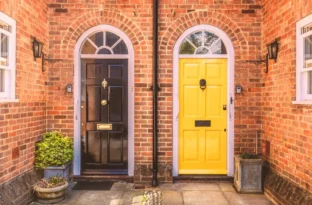What is Conveyancing?
29 February 2024 • 8 min read

See what our customers have to say about us.
Key Takeaways:
- Conveyancing is the legal process of transferring ownership of property.
- A licensed conveyancer or solicitor manages contracts, searches and communicates with all parties involved in the property transaction.
- For buyers, conveyancers assist with handling legal checks, searches, and contracts, ensuring the property meets the mortgage requirements.
- For sellers, conveyancers prepare the contract, manage buyer enquiries and oversee the legal transfer of ownership.
- The conveyancing process typically takes 8-12 weeks, depending on the property type and complexity of the transaction.
- Conveyancing fees usually range from £600-£1,500 plus disbursement fees (searches, Land Registry fees, bank transfers, etc)
Conveyancing involves a series of legal and administrative steps required to transfer a property from one person to another.
No one enjoys paperwork, especially when you’re eager to get on and move into your new home. But it’s worth remembering that the conveyancing process exists to protect you. It helps ensure you’re getting everything you expected from the deal – and nothing you didn’t.
To help you understand what happens, here’s a closer look at conveyancing and its importance in the process.
Do I need a conveyancer when buying or selling a home?
A conveyancer is a professional (either a solicitor or an accredited specialist known as a licensed conveyancer) handling the legalities of transferring the ownership of a property.
Can you bypass the conveyancer and handle everything yourself? While in theory, it’s possible to do it yourself, it’s far wiser to have a professional act for you. Additionally, if you are purchasing a property and taking out a mortgage, the lender will typically require you to have a qualified conveyancer to protect your interests.
Your conveyancer is essential as they handle any issues with the contract or the searches relating to the property. They arm you with knowledge, so you can make informed decisions on whether to go ahead with the deal or to renegotiate the price. They will also handle communications with the other party’s representatives, ensuring that all necessary tasks are completed on time.
Working with an expert can save you a great deal of time and stress, as well as prevent potentially costly mistakes. Working with Muve, for example, helped a first-time buyer in Birmingham exchange in just 5 weeks using Muve Lightspeed, our premium conveyancing service. We employed our digital-first approach, which includes DocuSign, automated ID checks, a 24/7 client portal, and e-signatures, to streamline the process and reduce delays. These methods have proven to bring speed, clarity and peace of mind throughout the whole conveyancing process.
What is conveyancing in UK property transactions?
Here’s a rundown of what a buyer’s and seller’s conveyancer does at key stages of the process. For a more detailed understanding of the conveyancing process, please refer to our step-by-step guide.
What will a conveyancer do when you are buying a property?
1. Pre-contract enquiries
As a buyer, once your offer has been accepted, it’s time to apply for your mortgage and instruct your conveyancer formally.
Soon after, your conveyancer should receive the contract pack from the seller. This includes:
- The contract for the sale
- Documents from the Land Registry relating to ‘title’ (legal ownership)
- Property Information form and Fixtures, Fittings & Contents form
- Any relevant certificates and guarantees (e.g. on building work)
From kitchen fittings to rear access and neighbour disputes, the contract pack covers a wide range of information. Your conveyancer will review it with you and ensure you understand everything, flagging any potential issues. Where necessary, they will also consult with the seller for clarification.
If you are buying with a mortgage, your conveyancer will also confirm to the lender that the property complies with the lender’s requirements.
2. Conveyancing searches
The ‘searches’ refer to information reports about the property, as well as various authorities, and are essential to avoid any unwanted surprises later.
The most common ones are Local Authority and Drainage & Water. Taken together, these searches provide vital information on matters such as planning permission, up-and-coming traffic schemes and sewage connections. Depending on the property’s location, additional inquiries, such as those related to flooding and mining, may also be necessary.
With Muve, our conveyancer will carry out the searches and explain the results to you. Armed with this knowledge, you can ensure that you still want to proceed with the purchase.
For many clients, a search indemnity can be a better option than the full searches since they are much quicker to obtain and the insurance will cover the buyer in the unlikely event that a search issue arises at a later date.
3. Exchange and completion steps
When you are happy to proceed, and once both parties have agreed on a completion date, contracts are “exchanged”, which means you are legally committed to the purchase.
From then on until the time of completion (when the seller vacates the property so you can move in), there are some important formalities for your conveyancer to cover. This includes final checks with the Land Registry and ensuring that the funds from your lender are in place.
The conveyancer ensures that this all happens when it should. After successful completion, they check that the change of ownership is appropriately registered with the Land Registry.

What will a conveyancer do when you are selling a property?
1. Information gathering
As a seller, your conveyancer will ensure that the information in the ‘contract pack’ is complete and accurate.
This includes title deeds, existing mortgage details, guarantees, gas safety certificates and building regulations certificates.
Although you complete the Property Information and Fixtures, Fittings & Contents form yourself, it’s useful to be able to call on your conveyancer for help with these where necessary.
With Muve, we’ll prepare the actual contract and send all the necessary information to the buyer. We’ll take care of any queries from the other side.
2. Exchange of contracts
You may find that the buyer wants to renegotiate the price based on enquiries, search and survey results. Your estate agent will usually negotiate all of this for you, including the potential to and fro over the fittings to be included or the exact completion date, making sure you are happy with what’s agreed.
3. Pre-completion logistics
For managing the receipt of funds, paying off any existing mortgage, overseeing the transfer and title deeds, as well as coordinating the key handover, your conveyancer ensures everything is in place at the right time.
How long does conveyancing take?
“The conveyancing process typically takes between 8 and 12 weeks from the date an offer is accepted.”
The conveyancing timeline depends on the complexity of the transaction. For example, if the property is a leasehold or if a property chain is involved (e.g., if your ability to buy a new home depends on the sale of your existing property), this can prolong matters.
If your conveyancer is quick to respond to queries and is proactive in moving things along, it goes a long way in reducing delays. Local knowledge is also crucial to expedite the conveyancing process. For instance, knowledge of the London property market nuances would lead to expertise in dealing with the local city council. This can lead to faster conveyancing in London. Working with specialised services like Muve Lightspeed, clients can exchange in as little as 5 weeks (freehold properties) or 8 weeks (leasehold properties).
How much are conveyancing fees?
Conveyancing fees are typically £600 – £1,500 including VAT at 20%. On top of this are disbursements; i.e. the expenses your conveyancer pays on your behalf, such as searches and Land Registry fees. For purchases, in instances where Stamp Duty is not payable, disbursements are typically in the range of £125 – £200.
A larger bill does not necessarily mean better service. At Muve, we leverage digital technology to deliver services, including an online portal that keeps you informed about what’s happening, as well as online ID checks to reduce unnecessary paperwork. This, combined with our highly efficient in-house lawyers, helps to keep your transaction moving while also keeping fees low.
How long does Muve take to complete conveyancing?
Muve can reduce conveyancing timelines through streamlined digital processes, proactive case management and localised expertise. Our average conveyancing process is 4 weeks faster than the national average. With Muve Lightspeed, we can achieve an exchange in as fast as 5 weeks without compromising legal compliance and quality.
For more in-depth information about the conveyancing process, explore our knowledge hub. Start the quickest conveyancing process with Muve Lightspeed. Get a free conveyancing quote today!

Frequently Asked Questions:
Both can handle property transactions; however, solicitors are qualified lawyers regulated by the Solicitors Regulation Authority (SRA). They are trained in multiple areas of law so they can offer broader legal services. Their training make them better suited for complex property transactions.
Licensed conveyancers are regulated by the Council for Licensed Conveyancers (CLC) and specialise only in property law. They are specifically trained to provide conveyancing services and can handle standard property transactions.
Both solicitors and conveyancers follow the same legal process and standards in conveyancing. They also have the same professional indemnity insurance.
Both buyers and sellers need a conveyancer or solicitor to represent their legal interests. This means they both pay for their respective conveyancing fees at completion. Some disbursements are paid earlier, upon the request of the conveyancer.
Buyers pay more due to property searches (local authority, environmental, drainage), Stamp Duty (if applicable), mortgage-related work, and Land Registry fees.
A seller’s conveyancing fee is usually lower as they have fewer third-party costs. The fees they pay cover drafting and reviewing contracts, responding to legal enquiries, etc.
It’s legally possible to do your own conveyancing in the UK; however, it’s highly discouraged, especially if you have a mortgage. Almost all mortgage lenders in the UK will insist on having a qualified conveyancing solicitor to protect their investment.
Furthermore, the conveyancing process involves significant legal jargon, strict deadlines, and complex, time-consuming tasks. Leasehold properties involve complex documents and additional steps. Mistakes can be costly and could even lead to the property transaction falling through.
Working with a licensed conveyancer or solicitor reduces the risk of mistakes and delays. Not only that, but they also come with indemnity insurance, which will protect you in case negligence causes something to go wrong.
A conveyancer is a professional (either a solicitor or an accredited specialist known as a licensed conveyancer) handling the legalities of transferring the ownership of a property.
While, in theory, it’s possible to do conveyancing yourself, it’s far wiser to have a professional act on your behalf. Additionally, if you are purchasing a property and taking out a mortgage, the lender will typically require you to have a qualified conveyancer to protect your interests. They can handle any issues with the contract or the property-related searches, communicate with the other party’s representatives, and ensure that all necessary tasks are completed on time.
Working with an expert can save you a great deal of time and stress and prevent potentially costly mistakes.
Instruct a conveyancer if:
- For buyers, as soon as your offer is accepted.
- For sellers, once you decide to put your property on the market.
Early instruction helps minimise delays and ensure all legal checks are promptly accomplished.
You might also like
Conveyancing covers the legal and administrative processes by which the ownership of a home ...
Conveyancing usually takes 8-12 weeks to complete; however, this can vary depending on your ...

